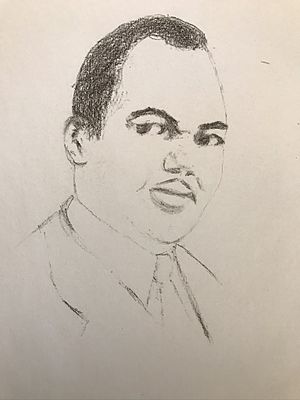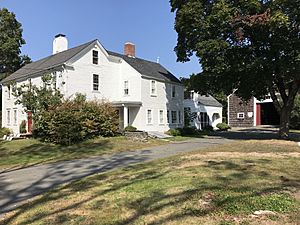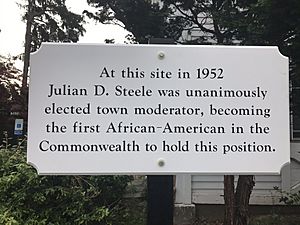Julian Steele facts for kids
Quick facts for kids
Julian Steele
|
|
|---|---|
 |
|
| Born |
Julian Denegal Steele
October 20, 1906 Savannah, Georgia, U.S.
|
| Died | January 17, 1970 (aged 63) |
| Occupation | Social worker, politician, civil rights activist, church leader |
| Spouse(s) |
Mary (Polly) Bradley Dawes
(m. 1938; d. 1970) |
| Children | Emilie Dawes Steele |
Julian Denegal Steele (born October 20, 1906 – died January 17, 1970) was an important American leader. He worked as a social worker, an activist for civil rights, and held many government jobs. He was often the first Black person to hold such positions in the New England area.
Contents
Early Life and Education
Julian Steele was born on October 20, 1906, in Savannah, Georgia. His father, Alexander McPherson Steele, worked for the postal service. When Julian was about seven, his family moved to Boston, Massachusetts. This was his mother's hometown. His mother, Minnie Sarah Ellis Steele, was the daughter of a minister from Jamaica. Julian's brother, Joseph Alexander Ellis Steele, became a famous jazz musician.
Julian went to Boston Latin School. He then graduated with honors from Harvard University in 1929. After that, he studied social work in New York City.
Social Work and a Special Marriage
After finishing his studies, Julian Steele became the director of the Robert Gould Shaw Settlement House in Roxbury, Boston. This was a place that helped people in the community. There, he met Mary Bradley Dawes, who worked in the settlement's day nursery.
Julian and Mary fell in love. However, their upcoming marriage caused a lot of talk because Julian was Black and Mary was white. This was called a "mixed-race marriage" at the time. Because of the controversy, Julian felt he had to leave his job at the Shaw Settlement. Some students at Mary's old college even protested their engagement.
After dating quietly for six years, Julian and Mary got married in May 1938 in New York City. Their wedding made headlines across the country. Despite the challenges, Julian Steele began working for Boston's new Armstrong Hemenway Foundation in 1939. This foundation focused on creating affordable housing for people.
Life in West Newbury: A Town Leader
In 1943, Julian and Mary Steele bought a farm in West Newbury, Massachusetts. This was a mostly rural town not far from Boston. They moved there when their daughter was a baby in 1944. Julian started a dairy farm. He said the countryside was a great place to raise a family. He also noted that in West Newbury, people with different ideas could live together peacefully.
In March 1952, Julian Steele was elected as West Newbury's town meeting moderator. He was the only Black voter among about 1,500 residents. This made him the first Black town moderator in Massachusetts! People in the town said he helped improve the community's cultural life. Julian helped start and lead the "wide-awake Town Hall Forum," which was a weekly lecture series. He also took part in the town's summer theater.
Julian Steele also helped the famous African-American singer Roland Hayes decide to buy a summer home in West Newbury. Hayes then performed at local events, including a charity concert. For at least ten years, Julian Steele was the only Black town moderator in Massachusetts. In New England's direct democracy town meetings, the moderator leads discussions and helps guide votes. These votes decide the town's budget and plans for the year. Julian Steele served as West Newbury's moderator until he passed away.
Important Government Roles
Julian Steele held many important jobs at the state and federal levels. He was often the first Black person to hold these positions.
Massachusetts Parole Board
In 1954, he was appointed to the Massachusetts Parole Board. This board decides if prisoners can be released early. During his time on the board, Massachusetts looked at whether to end the death penalty. Julian Steele was against the death penalty. He believed that "the state should not take a human life because the state cannot create it."
Federal and State Leadership
In 1960, Steele became an assistant administrator for the U.S. Housing and Home Financing Agency. He was in charge of New England and New York. Senator Leverett Saltonstall said that Steele was the first Black person to get such a high position in that agency.
In 1965, Steele became the Deputy Commissioner of Urban Renewal in Massachusetts. This department worked on improving cities. Then, in 1968, he was appointed commissioner of Massachusetts' new Department of Community Affairs. This made him the first Black person to lead an entire state agency in Massachusetts. At his swearing-in ceremony, Governor John Volpe said Julian Steele was the "ideal man" to help communities grow and fight poverty.
Civil Rights and Church Leadership
Julian Steele believed that "Human progress can be measured largely in terms of acceptance of difference as interesting and our common humanity as profoundly important." This idea guided his work in civil rights and religious groups. He always worked for causes like civil rights and affordable housing.
In 1937, The Crisis magazine, from the NAACP, wrote about Julian Steele. It mentioned his work helping Ethiopia and planning housing in Boston. He believed that Black and white people must work together. Julian Steele held several leadership roles with the NAACP starting in the 1940s. He was even president of the Boston Branch. In 1958, he became president of Boston's National Urban League.
Julian Steele also took on leadership roles in church groups. He was active in his church in West Newbury. He became a moderator for the Congregationalists of Essex County. Then he became vice-moderator for Massachusetts. In 1954, Steele was named the first Black moderator (a main leader for regular church members) of the Massachusetts Congregational Christian Conference.
Death and Lasting Impact
Julian Steele passed away from a heart attack on January 17, 1970, at his home in West Newbury. About 800 people attended his funeral in Roxbury. He was buried in West Newbury. The U.S. Congress honored him. In 1971, the Town of West Newbury read a statement. It said that Julian Steele was a "valuable and faithful public servant" who left an example for everyone to follow.
After his death, a housing center for older people in Melrose, Massachusetts, was named after him. An old housing project in Lowell, Massachusetts, was also named for him, but it has since been taken down. In 2019, West Newbury voted to put up a historical marker in his honor in front of Town Hall. Many of his important papers are kept at Boston University.
 | William L. Dawson |
 | W. E. B. Du Bois |
 | Harry Belafonte |



